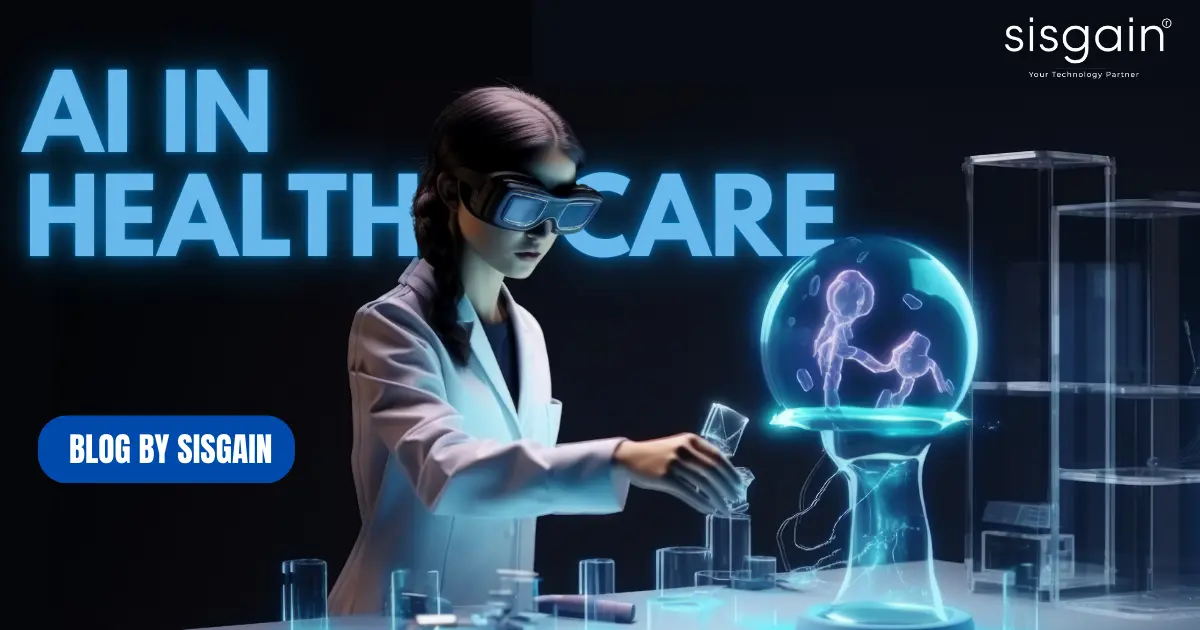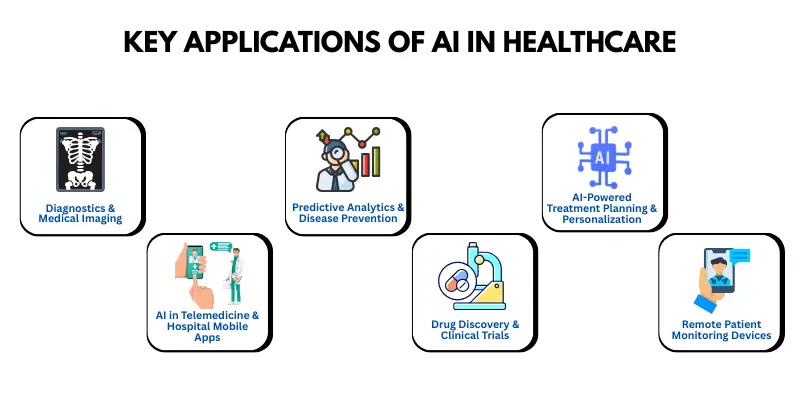Sales Team
Project quotes, partnerships, implementation

Artificial intelligence healthcare is no longer a futuristic concept—it is already transforming how hospitals, clinics, and medical professionals operate. From diagnosing complex diseases to assisting with drug discovery, artificial intelligence in healthcare has become a catalyst for innovation, efficiency, and better patient outcomes.
According to a recent report by Grand View Research, the global AI in healthcare market is projected to reach USD 208.2 billion by 2030, growing at a CAGR of over 37%. This rapid adoption highlights the critical role that healthcare and AI play together in shaping the future of medicine.
Healthcare systems today face mounting challenges: aging populations, rising costs, staffing shortages, and an overwhelming amount of data. Artificial intelligence healthcare solutions provide tools that can analyze massive datasets, support doctors with decision-making, and deliver highly personalized patient care. Whether through predictive analytics, medical imaging, or AI-powered hospital mobile apps, artificial intelligence in healthcare is revolutionizing the industry.
Artificial intelligence (AI) refers to the simulation of human intelligence processes by machines, particularly computer systems. In healthcare, AI integrates machine learning (ML), deep learning, and natural language processing (NLP) to analyze data, recognize patterns, and support medical decision-making.
These technologies form the backbone of artificial intelligence in healthcare, supporting innovations like automated diagnostics, predictive disease modeling, and intelligent hospital management systems. Partnering with an experienced Artificial intelligence development company helps healthcare providers implement these advanced solutions effectively and securely.

AI in healthcare is changing how doctors, hospitals, and patients work together. It helps with faster diagnosis, better treatment plans, and smarter ways to manage health. Let’s look at some of the main areas where AI is making a big difference in healthcare.
AI-driven diagnostics are revolutionizing radiology, pathology, and medical imaging. Algorithms can detect tumors, fractures, and abnormalities with accuracy comparable to or even surpassing human specialists. For example, AI systems like Google’s DeepMind have demonstrated exceptional accuracy in diagnosing over 50 eye diseases from scans.
By integrating artificial intelligence apps healthcare tools, doctors gain decision support that reduces diagnostic errors, accelerates treatment, and improves patient outcome
Predictive analytics, powered by AI, enables early detection of diseases and preventive healthcare strategies. By analyzing patient history, lifestyle, genetics, and environmental data, AI can forecast risks for chronic conditions such as diabetes, heart disease, or cancer.
Healthcare and AI collaborations are also used to predict patient readmissions, hospital resource demand, and disease outbreak patterns. This proactive approach significantly reduces costs while improving overall population health.
Artificial intelligence in healthcare is essential for precision medicine. AI systems analyze genetic data, medical history, and lifestyle factors to create personalized treatment plans for patients. For instance, IBM Watson for Oncology uses AI to recommend evidence-based cancer treatment options tailored to individual patient profiles.
This personalization improves treatment success rates and minimizes side effects, ensuring patients receive the most effective care possible.
Traditionally, drug discovery is time-consuming and expensive. AI accelerates the process by identifying promising drug candidates, predicting molecular interactions, and optimizing trial designs. Startups and pharmaceutical giants alike are leveraging AI to bring life-saving drugs to market faster.
Artificial intelligence healthcare applications also improve patient recruitment and monitoring in clinical trials, ensuring better compliance and more reliable results.
Telemedicine has expanded rapidly, especially after the COVID-19 pandemic. AI integration enhances medical software development services by offering chatbots for triage, symptom checkers, and intelligent scheduling.
Additionally, hospital mobile apps powered by AI provide real-time support for patients, from appointment reminders to medication management. These apps create seamless communication between doctors and patients, improving accessibility and engagement.
AI plays a crucial role in Remote Patient Monitoring devices (RPM). These devices continuously track vital signs such as heart rate, blood pressure, or oxygen levels. AI algorithms analyze the data to alert healthcare providers in case of abnormalities.
This technology reduces hospital visits, enhances chronic disease management, and empowers patients to take control of their health. For instance, AI-enabled RPM devices can detect early warning signs of cardiac arrest, enabling life-saving interventions.
Artificial intelligence healthcare solutions deliver a wide range of benefits across the healthcare ecosystem. By combining advanced technology with medical expertise, AI is helping providers deliver faster, safer, and more cost-effective care. Ensuring AI safety in healthcare is a key part of this process, as it guarantees that AI systems operate reliably, protect patient data, and support clinical decision-making. Here are some of the most significant advantages:
AI helps automate routine and time-consuming administrative tasks such as medical coding, billing, scheduling, and claims processing. This reduces the workload for healthcare staff and allows doctors and nurses to spend more time on direct patient care rather than paperwork.
One of the biggest strengths of AI is its ability to analyze vast amounts of data quickly and accurately. AI-powered diagnostic systems can detect diseases at early stages and minimize human errors. This leads to more precise diagnoses, better treatment plans, and improved outcomes for patients.
With AI tools, healthcare providers can predict health risks earlier and encourage preventive care. By catching illnesses before they become severe, hospitals and clinics can avoid unnecessary hospitalizations and lower overall treatment costs.
AI supports personalized care by analyzing patient history and preferences to create customized treatment plans. Faster response times, smarter hospital mobile apps, and AI chatbots also improve communication and make patients feel more connected to their healthcare providers.
As populations grow, AI ensures that healthcare systems can serve larger groups of patients without sacrificing quality. From telemedicine to remote monitoring, healthcare and AI together create scalable solutions that bring care to more people efficiently.
Despite its many advantages, artificial intelligence in healthcare also comes with a set of challenges that need to be addressed before it can reach its full potential.
AI relies on large amounts of sensitive patient information, making data privacy and security critical. Healthcare organizations must ensure compliance with regulations like HIPAA and GDPR to protect patient trust and prevent data breaches.
If AI systems are trained on limited or non-diverse datasets, the results may be biased. This can lead to unequal treatment recommendations or misdiagnoses, especially in underrepresented groups. Ensuring fairness and diversity in data is essential.
AI technologies in healthcare require extensive testing, validation, and approvals from regulatory bodies. This process, while necessary to ensure safety and accuracy, often slows down the adoption of new solutions.
High costs of implementation, the need for advanced infrastructure, and a shortage of professionals skilled in AI create significant obstacles. In some cases, resistance to change among healthcare staff can also delay adoption.
Overcoming these challenges requires a balance between innovation and responsibility, supported by strong ethical guidelines, investment in training, and robust regulatory frameworks.
The future of artificial intelligence healthcare is full of opportunities, with emerging trends that are set to redefine how care is delivered. AI is moving beyond data analysis to actively assist in treatment, prevention, and personalized care.
AI-powered surgical robots are already assisting surgeons with enhanced precision, reducing risks during complex procedures and improving recovery times. These technologies will continue to evolve, making surgeries safer and more efficient.
Smartwatches, fitness trackers, and biosensors combined with AI will continuously monitor vital signs like heart rate, oxygen levels, and glucose levels. This real-time health monitoring empowers patients to take control of their well-being while enabling doctors to intervene quickly when needed.
AI makes it possible to create digital replicas of patients, known as digital twins. These models can simulate different treatment options and predict potential outcomes, helping doctors make informed decisions before applying them in real life.
By analyzing genetic profiles and lifestyle data, AI will provide highly personalized treatment plans tailored to each individual, increasing treatment effectiveness and reducing side effects.
With the rise of AI Apps, healthcare will continue Powering Healthcare through innovation, efficiency, and accuracy, driving a seamless digital transformation.
To leverage artificial intelligence healthcare effectively, hospitals and medical organizations must collaborate with the right technology partners.
Working with an Artificial intelligence development company ensures access to skilled expertise, robust infrastructure, and tailored AI solutions. Similarly, partnering with Medical App Development Companies provides healthcare organizations with innovative hospital apps, AI-powered telemedicine platforms, and custom software that align with compliance standards.
These partnerships are essential for accessing advanced Medical software development services, ensuring seamless integration of AI into existing healthcare systems.
Artificial intelligence in healthcare is not just a trend—it is a revolution that is shaping the future of medicine. From diagnostics and predictive analytics to drug discovery and remote monitoring, AI is enabling faster, more accurate, and cost-effective care. Healthcare and AI together are building a patient-centered system that prioritizes prevention, personalization, and accessibility.
As the industry continues to evolve, choosing the right AI partner becomes critical. Organizations looking to embrace this transformation should collaborate with experts in artificial intelligence development, telemedicine solutions, and hospital mobile apps.
If your organization is ready to harness the power of AI and transform patient care, connect with us today. Together, we can shape the future of healthcare with technology that saves lives, reduces costs, and enhances patient experiences. At SISGAIN, we deliver innovative healthcare software development services designed to empower healthcare providers with AI-driven solutions.
Project quotes, partnerships, implementation
Open roles, referrals, campus hiring